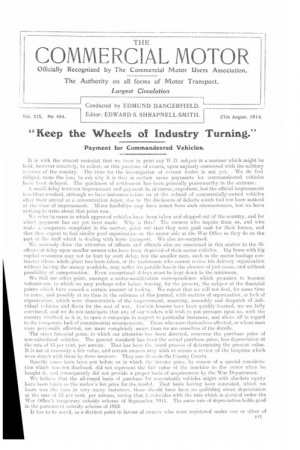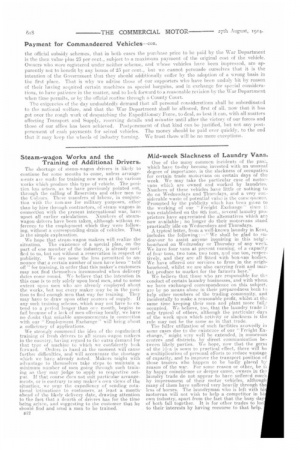"Keep the Wheels of Industry Turning."
Page 19

Page 20

If you've noticed an error in this article please click here to report it so we can fix it.
Payment for Commandeered Vehicles.
It is with the utmost restraint that we treat in print any W.D. subject in a manner which might be held, however remotely, to reflect, at this tincituru of events, upon anybody connected with the military services of the country. The time for the investigation of certain laches is not yet. We do feel obliged, none the less, to ask why it is that in cottain areas payments for commandeered vehicles have been delayed. The quickness of settlement has been generally praiseworthy in the extreme, _1 small delay between impressment and payment is, of course, expedient, but the official impressment. is seldom revoked, although we have instances before us of the refusal of commercially-owned vehicles after their arrival at a concentration depot, dee to the disclosure of defects which had not been noticed at the time of impressment. Minor hardships may have arisen from such circumstances, but we have nothing to write about that point now.
We refer to cases in which approved vehicles have been taken and shipped out of the country, and for which payment, has not yet been made. Why is this? The owners who inquire from us, and who make a temperate complaint in the matter, point out that they were paid cash for their horses, and that they expect to find similar good organization on the motor side at the War Office as they do on the part of the staff which is dealing with horse transport, We also are,•surprised.
We seriously draw the attention of officers and officials who are concerned in this matter to the ill
effects of delay upon smaller owners who have been deprived of their motor vehicles. Big firms with big capital resources may not be hurt by such delay, but the smaller men, such as the motor-haulage contractor whose whole plant has been taken, or the tradesman who cannot. revive his delivery organization without having the money available, may suffer irreparable loss in the absence of justcause, and without possibility, of compensation. Even exceptional delays must be kept down to the minimum.
We find one other point, amongst a motor-mobilization correspondence which promises to become voluminous, to which we may perhaps refer before leaving, for the present, the subject of the financial points whieli have. caused a certain amount of feeling. We repeat that we will not deal, for some time to come, amid possibly at no time in the columns of this journal, with matters of organization, or lack of organization. which were characteristic of the impressment, manning, assembly and despatch of :individual vehicles and fleets for the seat of war. Certain lessons have been quickly learned, we are fully convinced, mind we do not anticipate that any of our readers will wish to put pressure upon. us, with the country involved as it is, to open a campaign in respect to particular instances, and above all in regard to the teurporary lack of commissariat arrang,ements. Those who were themselves affected, or whose men were persoually affected, are more completely aware than we are ourselves of the details.
The other financial point, to which our attention has been directed, concerns the purchase price of
non-subsidized vehicles. The general standard has been the actual purchase price, less depreciation at the rate of 15 per cent, per annum. That has been the usual process of determining the present value. It is not of necessity a fair value, and certain owners may wish to secure a review of the bargains which were struck with them by force majeure. They can do so in the County Courts.
Specific cases have been put before us in which the invoice price, by reason of a special consideration which was not disclosed, did not represent the fair value of the machine to the owner when he bought it, and consequently did not provide a proper i}aSiS or acquirement by the War Department.
We believe that the all-round basis of purchase for non-subsidy vehicles might with absolute equity have been taken as the maker's list price for the model. That basis having been conceded, which we learn was the ease in very many instances, there should have been no quibbling about depreciation at the rate of 15 per cent. per annum, seeing that itcoincides with the rate which is granted under the War Office's temporary subsidy scheme of September, 1011. The same rate of depreciation holds good in the permanent subsidy scheme of 1012.
It has to be noted, as a distinct point in favour of owners who were registered under one or other of nfl the official subsidy schemes, that in both cases the purchase price to be paid by the War Department is the then value plus 25 per cent., subject to a maximum payment of the original cost of the vehicle. Owners who were registered under neither scheme, and whose vehicles have been impressed, are • apparently not to benefit by any bonus of 25 per cent., but we cannot persuade ourselves that it is the intention of the Government that they should additionally suffer by the adoption of a wrong basis in the first place. That is why we advise those of our supporters who have been unduly hit by reason of their having acquired certain machines as special bargains, and in exchange for special considerations, to have patience in the niatter, and to look forward to a reasonable revision by the War Department when time permits, or by the official routine through a County Court.
The exigencies of the day undoubtedly demand that all personal considerations shall be subordinated to the national welfare, and that the War Department shall be allowed, first of all, now that it has got over the rough work of despatching the Expeditionary Force, to deal, as best it can, with all matters affecting Transport and Supply, reserving details and minutia until after the victory of our forces and those of our allies has been achieved. Postponement of that kind can be justified, but not any postponement of cash payments for seized vehicles. The money should be paid over quickly, to the end that it may keep the wheels of industry turning. We trust there will be no more exceptions.






































